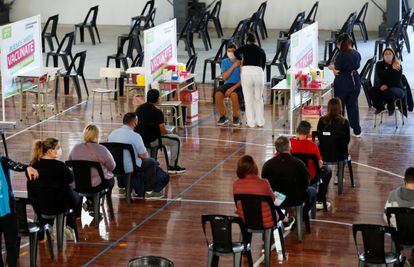A vaccination center against covid-19 in Buenos Aires, Argentina, this Friday.AGUSTIN MARCARIAN / Reuters
Argentina's Ana María Lacamoyre, 62, felt relieved on May 15 when she received the first dose of the Sputnik V vaccine in Buenos Aires. The puncture somewhat reduced her fear of contracting covid-19, the disease that had kept her almost confined at home for more than a year, like many of her contemporaries, considered a risk group. But the impatience for the second dose is growing, just two days before the 84 maximum interval between one and another expires. Lacamoyre is among the more than seven million Argentines who have not completed the vaccination schedule due to the lack of the second component of the Russian inoculant. Given the delays in delivery and the aggravated risk of the delta variant, the Argentine Government has decided to bet on the combination of vaccines. As of this Friday,Those who have already received Sputnik V will be offered the possibility of a second dose of Moderna or AstraZeneca.
More information
Argentina starts an electoral campaign marked by the health and economic crisis
Argentina claims Russia for the delay in the delivery of the Sputnik V vaccine
Argentine Health Minister Carla Vizzotti announced Wednesday that the country is "in a position to advance in the 24 jurisdictions to exchange different vaccines, starting with Sputnik V, Moderna and AstraZeneca" to complete immunization schedules.
The decision was made based on different clinical trials, including one conducted in Buenos Aires that resulted in similar levels of immunity between people who combined Sputnik V and AstraZeneca with those who received two doses of the Russian vaccine.
"The voluntary exchange of vaccines that Sputnik received will be offered," the minister said at a press conference. Of the nearly 45 million inhabitants of Argentina, 25.3 million have received a first dose, compared to 7.7 million who have both, according to official data. The objective of the new strategy is that at least 60% of those over 50 years of age have the complete vaccination scheme in August to protect them against covid-19, especially in the face of the aggravated risk posed by the delta variant. The new, more contagious strain has been detected in travelers from abroad and in close contacts, but for now there is no community circulation in the country, which accumulates almost five million infections and more than 107,000 deaths from coronavirus.
Sputnik V is based on a human adenoviral vector platform and uses different vectors for each dose. The Argentine government has changed the vaccination strategy after unsuccessfully pressuring Russia to regularize shipments of the second component and hinting that they could cancel the current contract.
The Russian vaccine was the first to be available in the country, at the end of December, and that is why it began to protect the older population with it. At that time, the doses committed to AstraZeneca had been delayed and negotiations with Pfizer were at a standstill. Half a year later, the European laboratory has normalized the distribution and the obstacles for the Americans have been cleared, but the problems with the reception of Sputnik V continue. This month, a local laboratory will produce about three million second doses of the Russian vaccine, but more than twice that are needed.
“A lot of people already got both. I don't know what's going on with Sputnik, ”laments Lacamoyre, who this week accompanied her thirty-year-old son to receive the second Sinopharm injection, just a month after the first. "They say that with another vaccine there would be no problem, no rejection of anything, but if one can claim to be given the same, I prefer the second from Sputnik," he thinks about the possibility opened by the Government. Her main concern now is to get her 63-year-old husband immunized at home, who cannot attend a vaccination due to his disability, worsened during the pandemic.
Vilma Tolaba, on the other hand, believes that she will opt for the vaccine that they offer her before.
“For the grandson.
Because until we do not have both doses, we have restricted the possibility of him staying the night or spending a lot of time with him at home, "he says by videoconference.
"Since the vaccines appeared, we have fully trusted, as before, we also trusted the vaccines that we gave to our children, without asking the brand," he adds.
At his side, his partner, also with a single dose, is excited to "go back on the road and travel."
Subscribe here to the
EL PAÍS América
newsletter
and receive all the information keys on the region's current affairs

